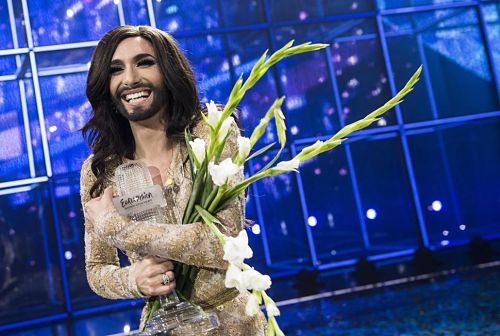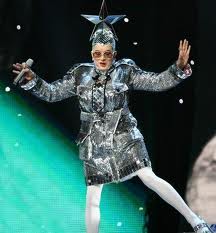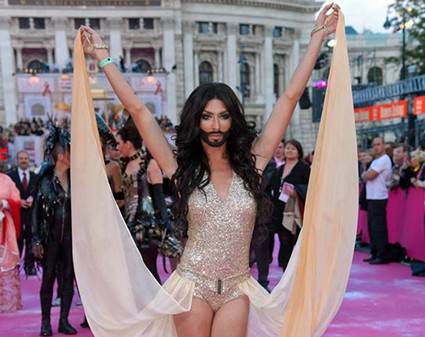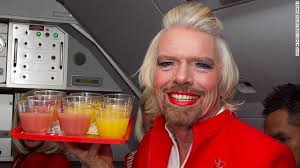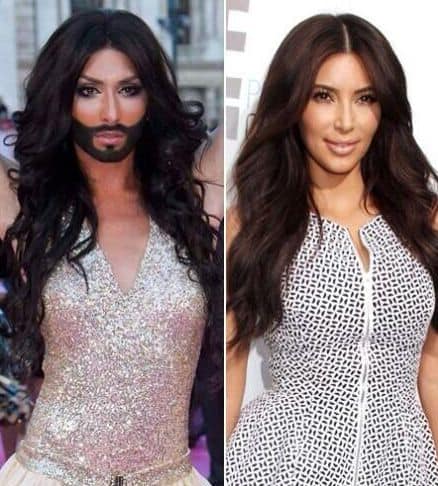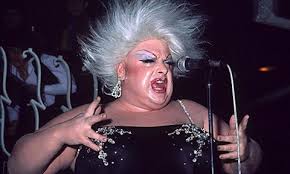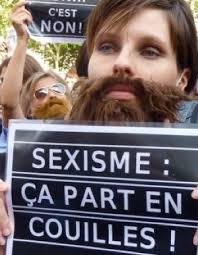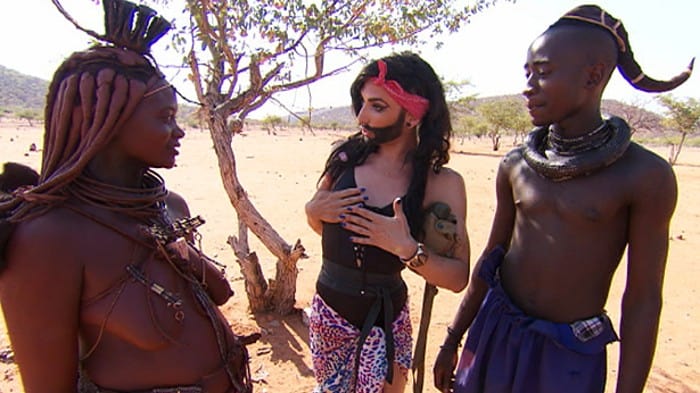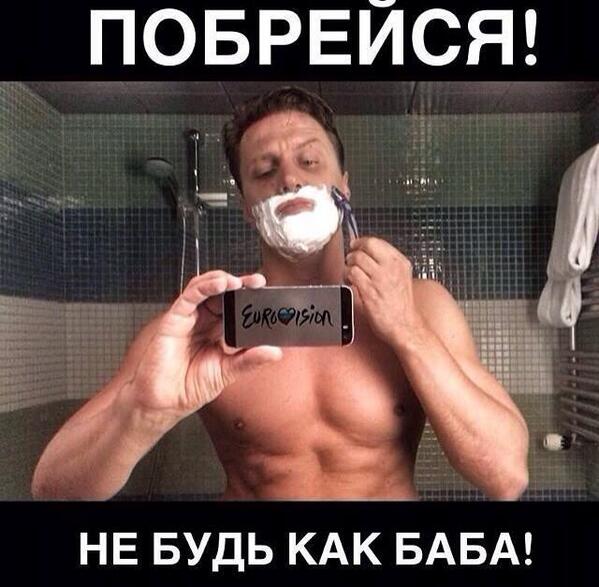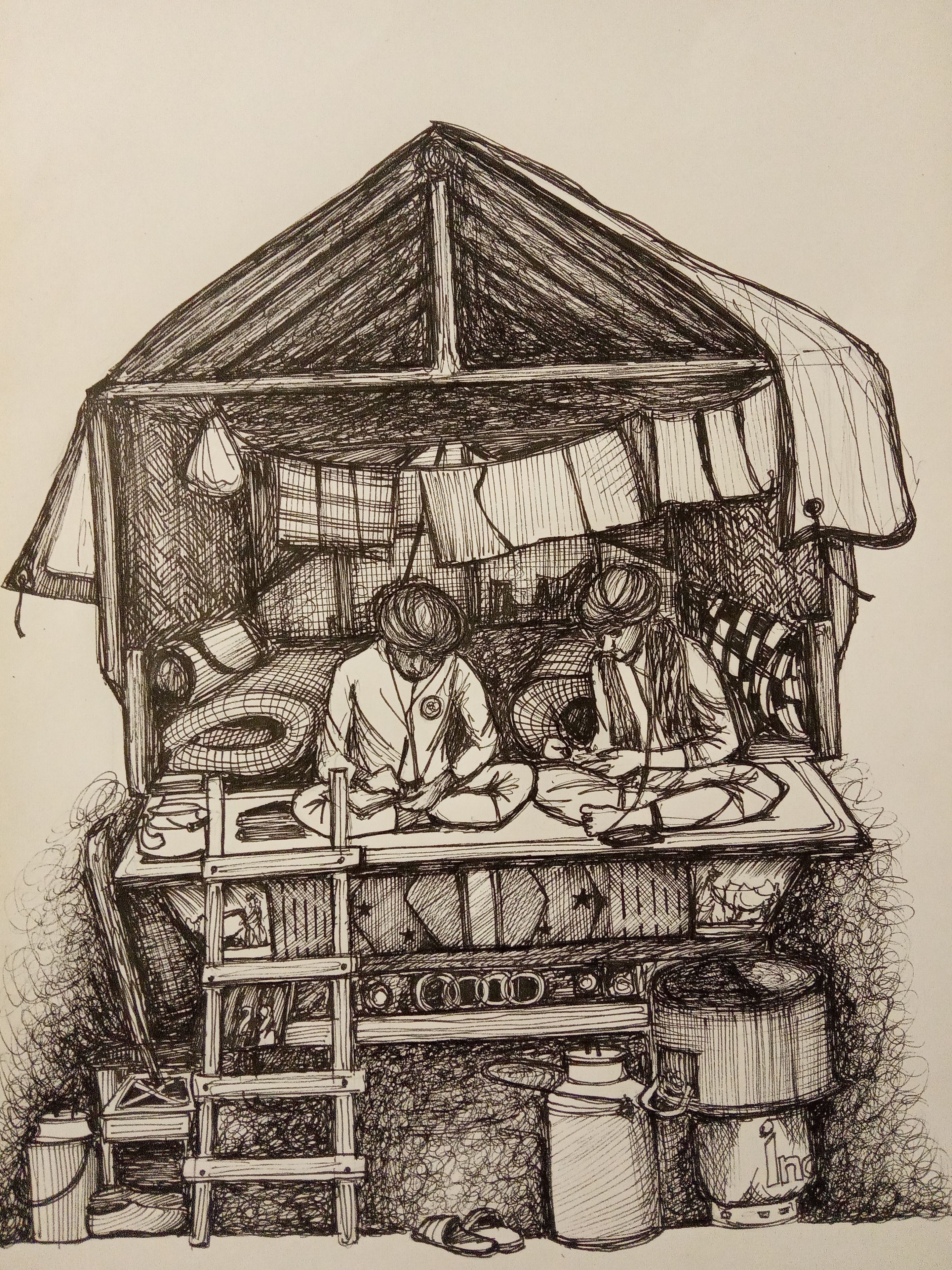Lights, Camera, Action. The climax approaches as the score count continues in one of the biggest – and certainly the strangest – annual European media spectacles also known as the Eurovision Song Contest. During the week leading up to the Grand Finale we have met the customary parade of eccentrics, all striving to capture the hearts and attention spans of hundreds of millions of spectators around Europe and beyond. It is a rare moment of primetime TV where Camp meets Kitsch – and perhaps marries it too! And oh right, there is also a bit of music.
Suddenly the countdown stops as the show hosts announce: We have a winner! No matter how the outstanding scores turn out, topping the lead candidate is now impossible – Conchita Wurst of Austria, aka ‘the bearded lady’, has just won the Contest of 2014! Massive cheers break out as the camera zooms toward the emotional winner. With teary eyes and trembling hands, the artist faces the camera, and mouths a heartfelt ‘THANK YOU’! The moment embodies an evident fulfillment of a lifelong dream, and only a person with a heart of stone could feel indifferent.
Ah, the Eurovision Song Contest. How to explain it to those who have grown up without watching its suspense-filled live-broadcasts year after year, along with the painstakingly slow counting of ‘poängs’ from all the participating countries! It is a rare media fest, both a relic of a bygone era – the time before internet, Twitter or mobile phones – and a source of vivacious contemporary devotion. It is also likely the biggest Gay Parade in the world.
The Contest culminates in the 3-hour marathon finale broadcast live in virtually all European countries, yet the competition extends far beyond these concrete few hours. In Sweden for example – that being one of the most successful contestants of all time – the Melodiefestivalen, via which the national representative is chosen, forms an enormously popular series not unlike in The American Idols.
The Contest’s truly international dimension commences as the artists arrive at the pre-finale Red Carpet events at the organizing city – the capital of the state that won the contest the year before – which this year was Copenhagen. It is also here where the contest’s most crucial part takes place: as popular voting around Europe is notoriously unpredictable, securing one’s place in the media spotlight is a prerequisite for a successful outcome.
This was also the case for Wurst, who started making headlines from the first moment she debuted her jet-black whiskers. From there on her PR strategy was pretty much taken care of by the eloquent Eastern European politicians who declared her to transform Europe into a ‘Hotbed of Sodomy’, or alternately, in the words of Russian Nationalist politician Vladimir Zhirinovsky, to embody
The end of Europe. It has turned wild. They don’t have men and women any more. They have ‘it’.
These statements received vast additional exposure from online campaigns launched in Armenia, Belarus and Russia and gathering tens of thousands of signatures to have the singer removed or edited out of broadcasts in their home country. Of course this upset resulted in massive backlash from Western European media with everyone seizing the opportunity to position themselves on the side of the ‘tolerant & progressive’. Simultaneously Wurst’s fan base spread like wildfire, elevating her to an instant gay icon in true Eurovision-tradition. As well-known blogger Paris Lees notes, by the Finale virtually everyone in her vast networks in the UK gay community supported Wurst, and liking her had pretty much become the same as liking Beyoncé – mandatory.
Since her victory Wurst has continued to grace newspaper covers and internet sites, becoming something of an instant ambassador for #TOLERANCE. It seems difficult to envision that a mere week earlier few had ever heard of Tom Neuwirth, the Austrian singer and former boy band member behind Wurst’s character.
Somehow I struggle to make full sense of what is going on. Just what kind of tolerance is being promoted? Sure, I get the evident: in portraying both traditional female drag and a beard, Wurst is doing the most visible and blatant crossing of acceptable, dichotomized gender performances possible. To summarize predictable arguments against her: you can either look like a man or alternately, dress like a woman and do your best to ‘pull it off’. Choose a side and stick with it without crossing the line in between! And yes, here Wurst is undoubtedly a pioneer in the mainstream global media, a show-stopper who is both striking and disturbing.
What about the subtext beyond the evident? What is being disguised by the overwhelming attention directed at these well-placed strands of facial hair – and the paint that gives them their appearance as ‘the‘ gay beard of the moment?
Who in Wurst’s speeches are ‘the people’ whose perceptions she wants to change? Who – concretely – are her ‘imagined underdogs’? Men who want to dress in drag also on the days when they do not have the desire to shave? Men for whom wearing both a dress and a beard is a crucial part of their identity and who feel that this mixture is currently being denied of them?
In other ways, is she saying that the current degrees of tolerance toward differing, dichotomised gender identities remain too restrictive – or is she merely giving more oomph to the familiar message ‘do not discriminate against gays’? And yes, I strongly agree that as familiar as the latter message is particularly in the Eurovision context, judged by the intense lashing out against her which has only continued to grow after her victory particularly from Russia, this remains a message that needs to be made again and again.
But if so, what about the beard – is there anything particular about making this message with facial hair? Is the beard the lead actor in this story, or merely a supporting act?
What if we take a different approach and read Wurst’s message as being directed particularly at the gay community and its internal discrimination addressed for example by Susanna Helke in her recent documentary ‘American Vagabond’: that merely ‘being gay’ means no automatic respect or even entry into ‘the gay community’ as the community may be extremely discriminatory in matters such as prosperity and physical appearance. As is no news to anthropologists, to face discrimination as a group in no logical way means the lack of internal discrimination.
I admit that here I am out of my comfort zone – being unable to claim expertise on the gay community either through personal belonging or scholarly involvement – yet I will take my chances by continuing with a few thoughts. For one needs to be no expert to recognize that minus the beard, Wurst is pretty much the perfect embodiment of both drag and gay ideals: he is young, thin, white and beautiful – and holds an uncanny resemblance to Kim Kardashian as numerous bloggers have been quick to point out. Thus in my outside & lay woman’s eyes he pretty much embodies the makings of a gay icon also without the beard.
I find myself wondering: would Wurst have become the ultimate gay icon and celebrated spokesperson for tolerance if he had the physique of the legendary diva extraordinaire Divine and then had sported a beard?
Perhaps so – I claim to hold no answers but merely find myself puzzled at the perfection of the messenger for the rejoiced message that Wurst so successfully forwards.
And there are other dimensions still. I think in particular of the French feminist group La Barbe for whom the beard has likewise formed the culmination of their activism to showcase structural male chauvinism which continually discriminates against women. Although the group, formed in 2007, has received its fair share of publicity, it is far cry from the overnight media sensation that Wurst became. It feels almost too ironic that it took again a biological man to elevate the beard as a symbol of tolerance and equality in the eyes of the international media!
And with this, a few words of the final element that obsessive focus on Wurst’s beard disguises. Everyone of course knows that the borders of Europe are crumbling and that efforts to reinstate them and thus continue upholding the current world system based on dramatically unequal division of wealth are resulting increasingly in both random and systematic human tragedies.
Simultaneously intolerance on racial, religious and cultural grounds intensifies and inequality within Europe keeps growing as is also currently discussed here at Allegra. Yet this reality is neatly erased from view at the Eurovision Song Contest. When looking at both the performers and the live audience, one almost thinks that one has entered a time machine that has travelled back to an era where the populations of Europe were still homogenic, and racial diversity as well as discrimination thereof simply did not exist.
This is the most troubling downside at stake. For while celebrating the diversity that Wurst represents, the Western European media comes also across as being unequivocally on the side of the ‘good’, and as being fully past racism and Europe’s colonial past. But this, the blogosphere has been quick to point out, is neither true nor irrelevant as far as Wurst goes. For prior to becoming an internationally acclaimed champion for tolerance, Wurst for example participated in the infamous German reality show ‘Wild Girls’ which essentially featured small-time German celebrities that were taken to ascetic conditions and proceeded to detail their subsequent horror at their new surroundings. Does this detail matter, and if it does, how?
Should we treat Wurst as a blatant racist – not the messiah of tolerance – or merely someone whose PR strategy suffered a momentary lapse in judgement? Is the right thing consequentially to start being angry at Wurst as if she alone is responsible for such contemporary sustenance of racialized stereotypes in primetime TV, or is it better to use this as a reminder that present European mainstream culture is not past colonialism at all, as it is part of everything we do?
Whereas firm answers are hard to come by, these questions, among many others, embody viewpoints that are simply erased from view by the celebration of tolerance via focussing on the most evident, namely ‘The Beard’ – not unlike what I have previously argued to occur through focus on global #HAPPINESS.
And with all this said, there is still one alternative to consider: that in Wurst’s performance there is no hidden message at all, and that Tom Neuwirth is merely a gifted singer working with a bold background team who judged the mood of the moment correctly to make her lifelong dream of winning the Eurovisions come true via this unique combination of female and male aesthetics. Or as Wurst herself has said: “Hey, I’m just a singer in a fabulous dress, with great hair and a beard.” Whatever the case, I must say that this entire affair has me thoroughly confused.
Drawing any final conclusions on the Wurst business is tricky indeed as with each new observation comes a whole range of others and the subtext keeps on getting more complex!
I thought that I had reached the limits of subtext in the fake beards that particularly male supporters of Wurst wore during the Contest – I could not help but have a strong urge to tell them: ‘Dude, you do realize that you can just, like, GROW one?’
But more confusing layers keep arriving as apparently now, in continued backlash against all that Wurst embodies there is a widespread social media campaign in Russia to SHAVE one’s beard and post selfies of the process. Since Wurst’s victory, so the accompanying logic apparently goes, the beard has seized to be a symbol of masculinity and thus shaving it off is the best means to restore traditional manhood – if that makes any sense.
But then I discovered something more ironic still, namely something in the very Eurovision Song Contest 2014 itself. For there is also another song for which facial hair plays a crucial role – the song ‘Le Moustache’ by France and performed by TwinTwin which finished last and received hardly any attention at all. The irony: from the very beginning – even though I actually quite like Wurst’s powerful ‘Rise like a Phoenix’ – France’s song was my favourite, yet simply because of its musical qualities and catchy rhythm.
It was only later that I realized what its lyrics were about: it offers a powerful critique of our Western culture of abundance via a narrative of a person who has it ALL, everything they ever wanted in material possessions. But it’s never enough for she still wants more – and what she wants is a moustache! (Watch video here)
Warm thanks to Antu Sorainen for comments!

